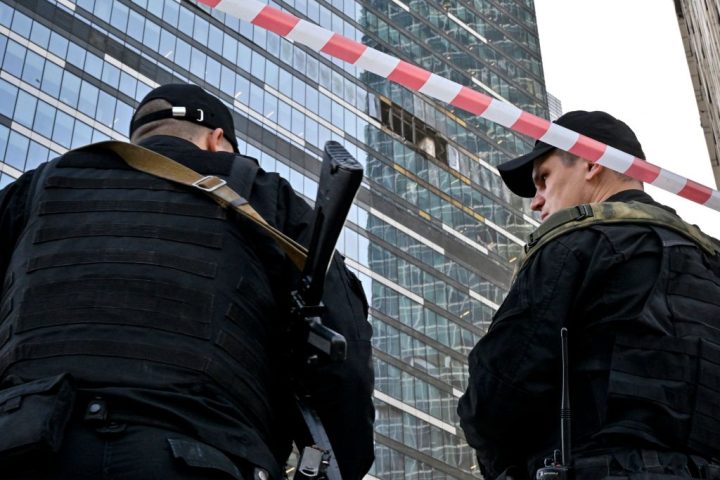A drone has hit a tower in Moscow’s financial district – just two days after the building was targeted in another attack.
In the early hours of this morning, the 21st floor of the IQ-Quarter building in Moscow City was hit by an unmanned drone, marking the second time in just over 48 hours that Russian governmental offices have been successfully targeted.
These attacks are bringing the idea home that Moscow is not the infallible fortress many have long believed it to be
The building is home to several Russian government offices, with the 21st floor making up part of the ministry of economic development. The area damaged by the drone is said to have been part of an open-plan office area; according to the mayor of Moscow, Sergei Sobyanin, approximately 150 metres squared of windows were damaged in the attack. With the ministries having reportedly switched to home working following the first attack at the weekend, there are no reported casualties.
The drone was one of three launched at Moscow last night, although only one reached the city. Two other drones were reportedly shot down in the Odintsovo and Naro-Fominsk areas on the approach to Moscow – areas which are getting increasingly used to seeing and hearing drones being shot out of the sky.
As has come to be expected, the Russian ministry of defence has blamed the drone attack on the ‘Kyiv regime’. Citing sources from the city’s air defences, the Kremlin-backed news agency TASS claims that the drones’ starting point have been traced to Ukrainian territory.
As well as being the second drone attack on the capital in several days, this marks the seventh such attack since the beginning of May. While Zelensky’s administration has yet to claim responsibility for the incidents, their increasing frequency and success rate makes it unconvincing that this is simply the actions of someone sympathetic to the Ukraine’s cause.
Drone attacks on Moscow are as much a strategy of psychological warfare as they are real warfare. They have almost entirely been conducted at night, potentially with the aim of lessening casualties, and have, with few exceptions, targeted non-residential buildings. This drip-feeding style of attack is, however, proving sufficiently dangerous to start unnerving Muscovites and bringing the idea home that Moscow is not the infallible fortress many have long believed it to be.
The symbolism of these drones mainly striking, or closely missing, Russian government buildings is not being lost on Muscovites. As I wrote yesterday, some have started to stay away from the city’s landmarks and avoiding the city centre where possible for fear of being caught up in an attack. These are the first signs that these drone strikes are indeed having an effect on Russian morale and faith in the Kremlin’s ability to keep locals safe.
In response to this morning’s attack, the Kremlin said that ‘measures are being taken’ to reinforce the city’s defences. Putin’s spokesman Dmitry Peskov has been keen to paint these attacks as ‘supposed acts of desperation’ by Kyiv following their ‘failures’ back in Ukraine.
But the fact remains that these drone attacks are at best incredibly embarrassing for the Kremlin. Back in January a big show was made of the air defences installed on rooftops around Moscow, including on that of the ministry of defence, which was narrowly missed in a drone attack last month.
The Kremlin has also made frequent reassurances that they have installed sufficient defences to protect the city; just yesterday Peskov said there were no plans to further raise the terrorist threat level in the city. The most poignant question, then, is how these drones have been able to cover the 300 miles from Ukraine into Russian territory before even getting close to Moscow. This is something that Russians themselves are asking.
Despite Russia’s best efforts to paint them otherwise, these attacks in fact appear to be a demonstration of Ukraine’s growing confidence and strength, if indeed Kyiv is responsible.
Yesterday an emboldened Zelensky declared that war would be ‘returning to the territory of Russia’; today his advisor Mikhail Podolyak issued the most direct, ominous warning yet:
Moscow is quickly getting used to a full-fledged war, which will soon finally move into the territory of the ‘authors of the war’ in order to collect all their debts from them … Everything that will happen in Russia is an objective historical process. More unidentified drones, more collapse, more civil conflicts, more war…
This falls short of an acknowledgement of responsibility but it is an unmistakable warning of bigger things to come. Whether Podolyak’s veiled threat will come to pass, and whether Ukraine will directly have a hand in those events, remains to be seen.







Comments